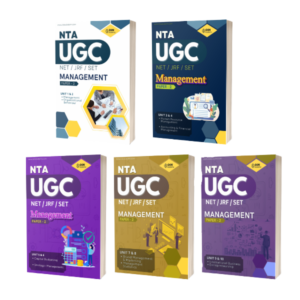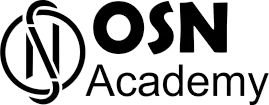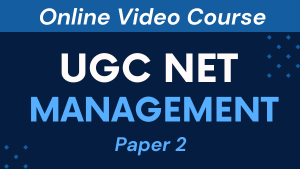

14526 +

12+
Ex Govt Professors

1200+

410

1600 +

24 x 7
UGC NET SET JRF – Management

- ✅ Hard Copies of All Study Material Books
- ✅ Dispatched via postal service within 4-5 business days
- ✅ Paper – 1 Book Free
- ✅ Study Material is Enriched with Ex-Govt Professors with vast experience of teaching
Past Year Papers
Past year exam papers help you understand the exam pattern, identify important topics, and improve time management and confidence through practice.
01: MCQ -Mock Test | Business Management Principles
Demo – UGC NET Management
02: Principal of Management
Unit 1 – UGC NET Management
03: Organiztional Behaviour
Unit-2 – UGC NET Management

Know Before You Go
Highlights of This Course
- Best quality video lectures
- High-quality PDFs & revision notes
- Covers all topics of UGC NET Paper 2
- Based on New UGC NET Syllabus
- Explanation in easy language for quick comprehension
- 360 Degree Syllabus Coverage
- Mock Tests series as per latest exam pattern
- Practice through Previous years Solved Papers (2018 to 2023)
- Free Online Tests to know the weak topics and practice
- Free access to more than 3000+ relevant Questions
Most Selling Courses

Buy Now!

Buy Now!

Buy Now!

Buy Now!
- Online Video Classes according to Latest Syllabus
- Precise PDFs / Notes on App
- Course Validity
- Test Series
- Offline Videos Download Option
- Compatible for MOBILE (iOS & Android), TABLET, DESKTOP & LAPTOP
- All the Key topics covered in the videos
- Best Technology used in OSN App for Smooth Video Streaming
- Videos are Easy to understand, Hassle-free retain the collaborative mode in videos to enhance the preparation.
- Buy Only Video Classes
- Bilingual Online Video Classes for Better Understanding
- Buy Only NET SET JRF Management Mock Test Series
- Buy Only Books (Study Material)
- Buy Combo Class + Books (Discounted Price)
Flexibility: Learn at your own pace and on your own schedule, accommodating personal and professional commitments.
Accessibility: Access course materials from anywhere in the world with an internet connection, eliminating geographical barriers.
Cost-Effectiveness: Often more affordable than traditional in-person courses, reducing expenses related to travel, accommodation, and materials.
Variety of Options: Wide range of courses available across various subjects, providing numerous choices to suit individual career goals.
Self-Paced Learning: Ability to control the speed of learning, allowing for deeper understanding and review of challenging concepts.
Diverse Learning Materials: Utilize online videos, interactive simulations, and online quizzes to enhance learning.
Personalized Experience: online courses offer adaptive learning technologies that cater to individual learning styles and needs.
Convenience: Access to coursework and resources 24/7, fitting learning into busy schedules.
No Commuting: Save time and money by eliminating the need to travel to a physical location.
Updated Content: Access to up-to-date information and resources, often reflecting the latest trends and advancements in the field.
Reduced Pressure: Learn in a less formal environment, which can reduce stress and increase comfort for some learners.
Innovative Teaching Methods: Benefit from cutting-edge educational technologies and methodologies that may not be available in traditional settings.
UGC NET Management Syllabus
The complete topic-wise UGC NET Syllabus is provided here in this section. Candidates can refer to the subject-wise topics provided here to prepare for UGC NET Recruitment.
Unit 1: Management Function & Concept
- Management – Concept, Process, Theories and Approaches, Management Roles and Skills
- Functions – Planning, Organizing, Staffing, Coordinating and Controlling.
- Communication – Types, Process and Barriers.
- Decision Making – Concept, Process, Techniques and Tools
- Organisation Structure and Design – Types, Authority, Responsibility,
- Centralisation, Decentralisation and Span of Control
- Managerial Economics – Concept & Importance
- Demand analysis – Utility Analysis, Indifference Curve, Elasticity & Forecasting
- Market Structures – Market Classification & Price Determination
- National Income – Concept, Types and Measurement
- Inflation – Concept, Types and Measurement
- Business Ethics & CSR
- Ethical Issues & Dilemma
- Corporate Governance
- Value Based Organisation
Unit 2: Organizational Behavior & Human Resource Management
- Organisational Behaviour – Significance & Theories
- Individual Behaviour – Personality, Perception, Values, Attitude, Learning and Motivation
- Group Behaviour – Team Building, Leadership, Group Dynamics
- Interpersonal Behaviour & Transactional Analysis
- Organizational Culture & Climate
- Work Force Diversity & Cross Culture Organisational Behaviour
- Emotions and Stress Management
- Organisational Justice and Whistle Blowing
- Human Resource Management – Concept, Perspectives, Influences and Recent Trends
- Human Resource Planning, Recruitment and Selection, Induction, Training and Development
- Job Analysis, Job Evaluation and Compensation Management
Unit 3: Organizational Development & International Human Resource Management
- Strategic Role of Human Resource Management
- Competency Mapping & Balanced Scoreboard
- Career Planning and Development
- Performance Management and Appraisal
- Organization Development, Change & OD Interventions
- Talent Management & Skill Development
- Employee Engagement & Work Life Balance
- Industrial Relations: Disputes & Grievance Management, Labour Welfare and Social Security
- Trade Union & Collective Bargaining
- International Human Resource Management – HR Challenge of International Business
- Green HRM
Unit 4: Accounting & Financial Management
- Accounting Principles and Standards, Preparation of Financial Statements
- Financial Statement Analysis – Ratio Analysis, Funds Flow and Cash Flow Analysis, DuPont Analysis
- Preparation of Cost Sheet, Marginal Costing, Cost Volume Profit Analysis
- Standard Costing & Variance Analysis
- Financial Management, Concept & Functions
- Capital Structure – Theories, Cost of Capital, Sources and Finance
- Budgeting and Budgetary Control, Types and Process, Zero base Budgeting
- Leverages – Operating, Financial and Combined Leverages, EBIT–EPS
- Analysis, Financial Breakeven Point & Indifference Level.
Unit 5: Capital Budgeting & Management
- Value & Returns – Time Preference for Money, Valuation of Bonds and Shares, Risk and Returns;
- Capital Budgeting – Nature of Investment, Evaluation, Comparison of Methods; Risk and Uncertainty Analysis
- Dividend – Theories and Determination
- Mergers and Acquisition – Corporate Restructuring, Value Creation, Merger Negotiations, Leveraged Buyouts, Takeover
- Portfolio Management – CAPM, APT
- Derivatives – Options, Option Payoffs, Option Pricing, Forward Contracts & Future Contracts
- Working Capital Management – Determinants, Cash, Inventory, Receivables and Payables Management, Factoring
- International Financial Management, Foreign exchange market
Unit 6: Strategic Management & Marketing
- Strategic Management – Concept, Process, Decision & Types
- Strategic Analysis – External Analysis, PEST, Porter’s Approach to industry analysis,
- Internal Analysis – Resource Based Approach, Value Chain Analysis
- Strategy Formulation – SWOT Analysis,
- Corporate Strategy – Growth, Stability, Retrenchment, Integration and Diversification,
- Business Portfolio Analysis – BCG, GE Business Model, Ansoff’s Product Market Growth Matrix
- Strategy Implementation – Challenges of Change, Developing Programs
- Mckinsey 7s Framework
- Marketing – Concept, Orientation, Trends and Tasks, Customer Value and Satisfaction, Market Segmentation, Positioning and Targeting
- Product and Pricing Decision – Product Mix, Product Life Cycle, New Product development,
- Pricing – Types and Strategies
- Place and promotion decision – Marketing channels and value networks, VMS, IMC, Advertising and Sales promotion
Unit 7: Brand Management & Marketing Types
- Consumer and Industrial Buying Behaviour: Theories and Models of Consumer Behaviour
- Brand Management – Role of Brands, Brand Equity, Equity Models, Developing a Branding Strategy; Brand Name Decisions, Brand Extensions and Loyalty
- Logistics and Supply Chain Management, Drivers, Value creation, Supply Chain
- Design, Designing and Managing Sales Force, Personal Selling
- Service Marketing – Managing Service Quality and Brands, Marketing Strategies of Service Firms
- Customer Relationship Marketing – Relationship Building, Strategies, Values and Process
- Retail Marketing – Recent Trends in India, Types of Retail Outlets.
- Emerging Trends in Marketing – Concept of e-Marketing, Direct Marketing, Digital Marketing and Green Marketing
- International Marketing – Entry Mode Decisions, Planning Marketing Mix for International Markets
Unit 8: Management Statistic & Operations Management
- Statistics for Management: Concept, Measures Of Central Tendency and Dispersion
- Probability Distribution – Binominal, Poison, Normal and Exponential
- Data Collection & Questionnaire Design
- Sampling – Concept, Process and Techniques
- Hypothesis Testing – Procedure; T, Z, F, Chi-square tests
- Correlation and Regression Analysis
- Operations Management – Role and Scope
- Facility Location and Layout – Site Selection and Analysis, Layout – Design and Process
- Enterprise Resource Planning – ERP Modules, ERP implementation
- Scheduling; Loading, Sequencing and Monitoring
- Quality Management and Statistical Quality Control, Quality Circles, Total Quality
- Management – KAIZEN, Benchmarking, Six Sigma; ISO 9000 Series Standards
- Operation Research – Transportation, Queuing Decision Theory, PERT / CPM
Unit 9: International Business & Artificial Intelligence
- International Business – Managing Business in Globalization Era; Theories of International Trade; Balance of payment
- Foreign Direct Investment – Benefits and Costs
- Multilateral regulation of Trade and Investment under WTO
- International Trade Procedures and Documentation; EXIM Policies
- Role of International Financial Institutions – IMF and World Bank
- Information Technology – Use of Computers in Management Applications; MIS, DSS
- Artificial Intelligence and Big Data, Data Warehousing
- Data Mining and Knowledge Management – Concepts Managing Technological Change
Unit 10: Entrepreneurship
- Entrepreneurship Development – Concept, Types, Theories and Process, Developing Entrepreneurial Competencies
- Intrapreneurship – Concept and Process
- Women Entrepreneurship and Rural Entrepreneurship
- Innovations in Business – Types of Innovations, Creating and Identifying Opportunities, Screening of Business Ideas
- Business Plan and Feasibility Analysis – Concept and Process of Technical, Market and Financial Analysis
- Micro and Small Scale Industries in India; Role of Government in Promoting SSI
- Sickness in Small Industries – Reasons and Rehabilitation
- Institutional Finance to Small Industries – Financial Institutions, Commercial Banks, Cooperative Banks, Micro Finance
UGC NET Management Exam Pattern
The candidate has to clear the one stages of the exam pattern to be nominated with the post. Given below is the exam pattern of UGC NET exam pattern.
- A total of 150 questions are included in UGC NET Exam.
- Each question will carry 2 mark and no mark will be deducted for not answering the questions.
- There is a no negative marking for each incorrect responses.
UGC NET Management Course Syllabus
Unit 4- Accounting & Financial Management
- Lec 1-Basic Acounting Principles
- Lec 2-Preparation of Financial Statements
- Lec 3-Financial Statement Analysis
- Lec 4-Financial Statement Analysis - Fund Flow analysis
- Lec 5-Financial Statement Analysis
Unit 3- HRM & INDUSTRIAL RELATIONS
- Lec 1-Strategic Role Of HRM
- Lec 2-Competency Mapping
- Lec 3-Career Planning
- Lec 4-Performance Appraisal
- Lec 5-Managing Organizational Culture and Change
Unit 2- Organization Behaviour -Human Resource
- Lec 1-Organizational Behavior-Significance & Theories
- Lec 2-Personality
- Lec 3-Perception
- Lec 4-Learning
- Lec 5-Interpersonal Behaviour
Unit 1- Principal of Management
- Lec 1-Management Concept and Process
- Lec 2-Theories and Approaches P1
- Lec 2-Theories and Approaches P2
- Lec 4-Planning
- Lec 5-Organizing
Very simple and interesting way of teaching style. Clear all douts. Help in ours prepration. Best app for ugc net prepration (Home Science) This app help me lots and i qualified Net and also improve my knowledge and confidence. Thanks 🙏🙏 to all members of this app.
I really wanna say that sir your videos give me good vibes and make me feel confidence for my Exam because I am preparing for my IAS Mains English Literature optional…………..I wish to clear it in my👉 first attempt. I really like your way to understand and your teaching ability is super se bhi uper.
Recently in Feb 2022 I have joined osn as student I am preparing for upsc civil service exam and my optional is literature of English I personally feel it is very good for students to study with osn especially in online mode in which I have enrolled the apps is too smooth to use and it is very helpful for students like me to go through by there online uploads videos and time to time sir himself comes live to boost preparation. So aspirant like me very much satisfied with osn and Dr.A Agrawal sir
Osn Academy is the best educational institute for me. I have been reading and preparing ugc net exam since 2021 . This is a unique educational platform to help us everytime. We have available unit 1 to 11 notes. These hard copies study materials are helping to understand easily English Literature . Thank you sir 🙏ji.
It’s really best place to achieve success in competitive exams. Sir started crash course of English for NET exam, which is highly beneficial for the scholars like me. Very minute and micro things are interpreted by guide, and it’s really cherish for any other scholars who are in search of right place for guidance. I’m thankful to OSN Academy Crash Course
F.A.Qs
Frequently asked questions
A1: Candidates should have a Master’s degree in Management/ Business Administration/ related fields with at least 55% marks.
A2: The exam consists of two papers: Paper I (General Paper on Teaching and Research Aptitude) and Paper II (Management).
A3: Paper II covers:
Management Concepts and Theories
Organizational Behavior
Human Resource Management
Marketing Management
Financial Management
Operations Management
Strategic Management
Business Ethics and Corporate Governance
Quantitative Techniques and Operations Research
A4: 50 questions, all compulsory.
A5: 3 hours.
A6: No, there is no negative marking.
A7: Yes, candidates with MBA degrees from recognized distance learning programs are eligible.
A8: Twice a year, in June and December.


